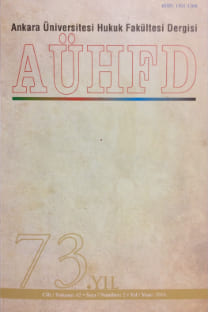Uluslararası Deniz Hukukunda Kıyı Devletinin kesintisiz takip hakkı
Günümüzde bilim ve teknolojideki ilerlemeler paralelinde kıyı devletlerinin denizlerin canlı, gaz, petrol ve mineral gibi kıt ve pahalı kaynaklarından daha fazla yararlanma ihtiyacı ve talepleri de artmış bulunmaktadır. Buna karşılık, deniz alanlarına ilişkin uluslararası hukuk düzenlemeleri ile kıyı devletlerinin kapasitelerinin yetersiz kaldığı görülmektedir. Bu itibarla, bir taraftan, uluslararası hukuk düzenlemelerinin günümüzün imkân ve ihtiyaçları ışığında güncellenmesi; diğer taraftan, bir kıyı devleti olarak Türkiye’nin üç tarafını çevreleyen deniz alanlarına ilişkin kapasitesini geliştirmesi, hem yeni teknolojilerin hem de uluslararası hukukun sağladığı imkân ve araçlardan maksimum düzeyde yararlanması gerekmektedir. Zira, bu incelemeden anlaşıldığı üzere, kıyı devletinin farklı deniz alanlarına ilişkin yetki ve kapasitesini tam anlamıyla kullanması, sadece kıyı devletinin etkinliği ve yararına değil, ayrıca uluslararası hukuk düzeninin sağlanmasına hizmet etmektedir.
The right to Hot pursuit of the coastal state under the international law of the sea
In parallel with the latest advancement in technology and science, the needs and the wants of coastal states to benefit more from scarce and precious resources such as gas, petrol, minerals and living sea resources have increased. However, current international law of the sea and relevant competence and capacity of the coastal states have evidently proven to be insufficient. With this respect, progressive improvement of the international law of the sea in the light of contemporary developments and current needs has been necessary on the one hand; Turkey, as a peninsula, needs to advance its competence and capacity related to its surrounding seas, and must utilize both new technologies and means afforded by the international law at a maximum level, on the other. It has become clear that the utilization of competence and capacity in full by the coastal states not only serves the benefits and effectiveness of the coastal states but also provides and facilitates for international law and order.
___
- Allen, Craig H., ‘Doctrine of Hot Pursuit: A Functional Interpretation Adaptable to Emerging Maritime Law Enforcement Technologies and Practices’, Ocean Development and International Law, Volume 20, 1989, ss. 309-341.
- Baird, Rachel, ‘Arrests in a Cold Climate (Part 2) - Shaping Hot Pursuit through State Practice’, Antarctic and Southern Ocean Law and Policy Occasional Papers, 2009, 13 . ss. 1-21 [http://eprints.usq.edu.au/5604/, erişim 21 Nisan 2013].
- Bantekas, Ilias and Nash, Susan, International Criminal Law (Second Edition, Cavendish Publishing, London, 2003).
- Baykal, Ferit Hakan, Deniz Hukuku Çalışmaları (Alfa, Bursa, 1998).
- Bozkurt, Enver, Kütükçü, M. Akif ve Poyraz, Yasin, Devletler Hukuku (Gözden Geçirilmiş 7. Baskı, Yetkin Yayınları, Ankara, 2012).
- Cassese, Antonio, International Law (Second Edition, Oxford University Press, Oxford, 2005).
- Churchill, R. R. and Lowe, A. V., The Law of the Sea (Third Edition, Juris Publishing, Manchester University Press, Manchester, 1999).
- Gilmore, William C., ‘Hot Pursuit: The Case of R. v Mills and Others’, International and Comparative Law Quarterly, Volume 44, Issue 4, October 1995, ss. 949-958.
- Gündüz, Aslan, Milletlerarası Hukuk, Temel Belgeler, Örnek Kararlar (5. Bası, Beta, İstanbul, 2003).
- Kuran, Selami, Uluslararası Deniz Hukuku (3. Baskı, Türkmen Kitabevi, İstanbul, 2009).
- Okur, Derya Aydın, Deniz Hukukunda Liman Devleti Yetkisi ve Denetimi (XII Levha, İstanbul, 2009).
- Pazarcı, Hüseyin, Uluslararası Hukuk (Gözden Geçirilmiş 11. Bası, Turhan Kitabevi Yayınları, Ankara, 2012).
- Report of the Secretary-General’s Panel of Inquiry on the 31 May 2010 Flotilla Incident, September 2011, (Facts, Circumstances and Context of the Incident, s. 4-5, paras viii, iv), paras 131, 134 [http://www.un.org/News/dh/infocus/middle_east/Gaza_Flotilla_Panel_ Report.pdf, erişim 11 Mart 2013].
- Reports of International Arbitral Awards, S. S. “I’m Alone” Case (Canada v United States), 30 June 1933 and 5 January 1935, Volume III, pp. 1609- 1618 [http://untreaty.un.org/cod/riaa/cases/vol_III/1609-1618.pdf, erişim 15 Mart 2013].
- Sur, Melda, Uluslararası Hukukun Esasları (Güncellenmiş 5. Baskı, Beta, İstanbul 2011).
- Tanaka, Yoshifumi, The International Law of the Sea (Cambridge University Press, Cambridge, 2012).
- The International Tribunal for the Law of the Sea, The M/V ‘SAIGA’ (No 2) Case (Saint Vincent and the Grenadines v Guinea), 1 July 1999, paras 146, 155 [http://www.itlos.org/index.php?id=64, erişim 25 Mart 2013].
- Topal, Ahmet Hamdi, ‘Uluslararası Hukukta Deniz Haydutluğu ve Mücadele Yöntemleri’, Ankara Üniversitesi Hukuk Fakültesi Dergisi, Sayı 59(1), 2010, ss. 99-130.
- United Nations, 1958 Geneva Conventions on the Law of the Sea, Geneva, 29 April 1958 [http://untreaty.un.org/cod/avl/ha/gclos/gclos.html, erişim 29 Nisan 2013].
- United Nations, Division for Ocean Affairs and the Law of the Sea, United Nations Convention on the Law of the Sea of 10 December 1982 [http://www.un.org/Depts/los/convention_agreements/texts/unclos/closi ndx.htm, erişim 29 Nisan 2013].
- ISSN: 1301-1308
- Yayın Aralığı: Yılda 4 Sayı
- Başlangıç: 1943
- Yayıncı: Ankara Üniversitesi Hukuk Fakültesi
Sayıdaki Diğer Makaleler
Siyâset-i Adliyyeden Mühim Bir Mebhâs (Muhamât Dergisi 12 - s. 361-367)
Uluslararasılasmıs Kosova Mahkeme sistemi
Avrupa Hukuk Enstitüsü’nün üstesinden gelmesi gereken zorluklar
Siyaset ve Ahlâk (İstişare, Sayı:13, Yıl:1324, s.590-597 ve Sayı:14, Yıl:1324, s.639- 641)
Uluslararası Deniz Hukukunda Kıyı Devletinin kesintisiz takip hakkı
